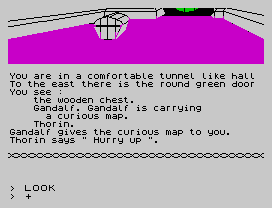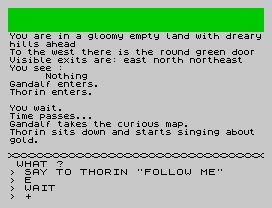Back in time, to a 1982 game I played in 1983, on my first computer (well, technically my father’s), a 48K ZX Spectrum: Melbourne House’s The Hobbit.

This game… well, it has a story, and I’m not talking about the “Bilbo, Gandalf and a bunch of dwarves go on a quest to retrieve a dragon’s treasure” one. I mean a personal story. I guess I could say that this game changed my life — as much as anything can change one’s life, I guess.
So you’ll have to bear with me — or, of course, skip this post. Because this one is as much about “why I’m the way I am” as it is about the game — perhaps more. And it’s a long one. 🙂 More after the break…
The Hobbit is a text adventure, with some graphics, but quite limited ones; the computer it was originally written on, the Spectrum, had existed only for months, and, besides, Melbourne House (the software house) would never be known for good graphics. The only decent image in the game is the loading screen. But, at the time, they were impressive, simply because they were there — most text adventures, even ones on “bigger” computers, were really text-only. Also, the parser was quite advanced for the time: while other games only supported 2-word commands in the form “verb noun” (e.g. “get sword” or “kill troll“), The Hobbit understood commands such as “take the short sword then viciously attack the troll with it“. You could also give instructions to NPCs, and they even had “personalities” of their own: they would move around independently of you, get into fights (and possibly even die off-screen), pick up and drop objects, and so on. They also could like you more or less, depending on both who they were, and your actions. That made the game much more unpredictable than most “standard” adventures, which could have solutions printed in magazines – not in The Hobbit, as one never knew what would really happen – “solutions” could, at most, tell you how to solve some specific puzzles.

And now, for the personal part. You see, that game was one of the half-dozen or so my father got with the family’s new ZX Spectrum, in 1983, and the only one of them that wasn’t a simple action game. Now, as a 9-year-old Portuguese kid, I knew virtually no English at the time. Not enough to read a book in English, not enough even to read a kids’ book, and certainly not enough to play a text adventure game in English. I am not exaggerating when I tell you I couldn’t even leave the starting location (Bilbo’s house).
Nor did I have the slightest idea of who Tolkien was, what Middle Earth was… I had never read a fantasy book in my life. It was a long time ago, but I think I recall that the most “advanced” books I had read at the time were Enid Blyton’s The Famous Five, in their Portuguese translation.
So, naturally, I put the game away – “boring text stuff”, I thought. And I played the other ones to death. But, soon, I got bored with them (and it would be a long time before my father got any more games)… yet I was still fascinated with the Spectrum, and that “strange text game” continued to intrigue me. So, I tried to find something more about it. I found some translated instructions, which at least told me how I was supposed to play the game – but that didn’t teach me English, of course. I read newspaper reviews (it wouldn’t be until 3 years later that I bought my first Speccy magazine, the 3rd issue of “Your Sinclair”), which said great things about the game, and, from them, I discovered some small things. Namely, that it was based upon a book, also called “The Hobbit“.
Which, being a curious kid, I asked my father to buy. A couple of weeks later, I had a nice Portuguese edition of the book. Which I read. At nine. (I only read The Lord of the Rings at 11, but that one’s not a children’s book at all.)
Next year, I got English for the first time at school, and I began to learn. And I always came back to the game, and a couple other text adventure games I later got. I also became more and more curious about fantasy, Middle Earth, and Tolkien.
So, this single, ancient computer game caused all the following changes in my life:
- it got me interested in reading “bigger” books (I had only read kids’ books until then);
- it make me discover that I really loved reading;
- it got me interested in fantasy (which, along with science fiction, is still my favorite literary genre today);
- it got me interested in Tolkien and Middle Earth (LotR is still my favorite book — I’ve read it more than 30 times –, along with The Silmarillion);
- it inspired me to learn English, and even in my early teens I was able to read anything in that language;
- it got me interested in more “complex” computer games (at a time and age when everyone else only enjoyed the simpler, reflex-based ones – even today, many older people still think of computer / video games as “dumb, basic kids’ stuff, with little spaceships shooting each other”, and can’t conceive of the idea of an adventure or strategy game);
- by “forcing” me to change my mind away from my initial impression of the game, it made me shake off some common prejudices, such as “if I don’t understand it instantly, then it can’t be good or interesting” — something most people sadly continue to believe, even as adults. This is one of the most important lessons I ever learned in my entire life;
- related to the above, it made me discover that there are some fascinating things out there that most people don’t know about, because of preconceptions, prejudices and intellectual laziness – but which, with a little bit of initial effort and thought, can be wonderful experiences. Why do you think I love heavy metal music, for instance?
- it made me discover the exhilarating feeling of solving a problem, or a puzzle, by thinking – a discovery which, incidentally, would be quite useful to me, decades later, as a sysadmin.
I could shorten most of the above in this way: I’m a geek mainly because of that game, 28 years ago. It was the turning point in my life; maybe if it wasn’t for it, I would have ended up being “normal”, “average” — listening only to “top 40” music, being obsessed with soccer (watching, not playing, of course 🙂 ), TV, cars and dumb women… and not caring about fantasy, reading, learning, or even simply thinking.
I would have been just like everyone else. In some ways, a horrifying thought. 🙂 Because, for all the price I’ve paid and am still paying, for all the rejections and disappointments and isolation and alienation and unfulfilled dreams and broken expectations… being a geek is, indeed, what I am, what I love to be, and what I’ll always be proud to be. 😉
As i was reading this article, i traveled to my youth, and despite the spectrum game that is referred here wasn’t one i knew, almost everything here could be my own text. Tolkien, Scifi, Heavy Metal, Programming… Great article, congratulations.
Thanks. 🙂
That completely describes me!!!!
A lovely article, about how the right thing came to you at the right time, it’s the perfect way for a kid to learn!! Good stuff.
I share many of the things you describe here (except *I* owned the spectrum). I’m a bit older and french but the many things you discovered thanks to this game have had the same impacts on me.
And from my foreigner point of vue, your english style seems elegant and rich. Ah, the reading of british magazines…
Hmmm I see you made “reviews” for Lords of Midnight and Kung Fu Master (had forgotten those names) : that talks to me. I’ll keep reading. Thanks for this “lovely” article as Brian wrote.
You attack Thorin.
But the effort is wasted, his defence
is too strong.
Thorin attacks -YOU- !!!
With one well-placed blow Thorin cleaves
your skull.
You are dead.
You have mastered 0.0% of this adventure.
Ahaha, I can’t believe this 🙂 I feel just like you, only that I was a bit older then, 13, 14 maybe, living in Almada. Oh, the sleepless nights trying to play that thing. The absolute shock and awe each time I managed to go beyond a certain level and was greeted with a totally unexpected picture on the screen. That game changed me. I began loving Tolkien and his universe, in a country hardly anyone read his books. Thank you for sharing.
Who else saw “The Hobbit” and remembered a ZX Spectrum game of the 80’s when Thorin started to sing?
I do, Alexsander. Thorin started singing about gold…
Just imagine being imprisoned in the Goblins dungeon, and trying desperately to escape from it to avoid both of us ending up as dinner for the Goblin king.
But I can’t do it alone, you need Thorin to help you.
And what does that big oaf do after asking him for his help?? He just sits down and starts to sing about his precious gold!!!
That usually was the enough-is-enough moment for me.
I got soooo infuriated by then that I took the Short Strong Sword and tried to kill him.
The effort, of course, was wasted and I ended up with a cleaved skull… 😉